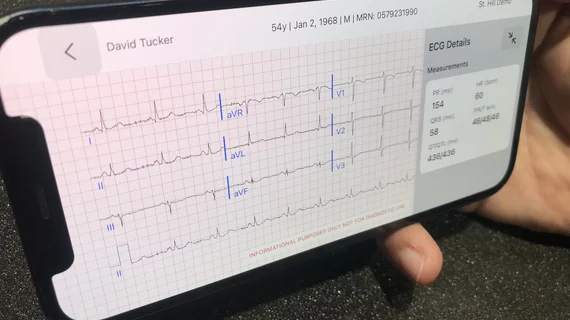Cardiology ranked No. 2 among all specialties with 122 FDA-cleared AI models
Cardiology continues to have the second largest number of clinical artificial intelligence (AI) algorithms cleared by the U.S. Food and Drug Administration, trailing only radiology. The FDA's latest update covers all AI approvals through May 2024.
There are now 122 FDA-cleared AI algorithms specific to cardiology. This makes up 14% of the 882 clinical AI algorithms now on the U.S. market.
The new FDA numbers include market clearances up to March 31, 2024. The first approval of a clinical AI algorithm was in 1995. The first cardiology specific algorithm was for HeartFlow FFR-CT in 2016. That algorithm was also the first AI to be included in a cardiology guideline when the 2021 AHA/ACC/ASE/CHEST/SAEM/SCCT/SCMR Guideline for the Evaluation and Diagnosis of Chest Pain was released.
Radiology continues to rank No. 1 for overall AI approvals with 649. Medical imaging AI accounts for 74% of all the FDA-cleared algorithms. Cardiology is a distant second, followed by neurology as an even more distant third with 22 algorithms.
AI has been a key trend at all cardiology meetings in recent years. While a lot of this has been focused on research, there is also a lot of discussion in sessions and on expo floors about actual clinical implementation.
"AI offers us the potential to help raise our awareness of different diseases. In the future, we could be looking at a situation where AI raises suspicion for various diseases, and expert echocardiographers work collaboratively with AI to make accurate diagnoses," explained Jeremy Slivnick, MD, assistant professor of medicine and an advanced cardiac imager at the University of Chicago, who recently spoke to Cardiovascular Business about his research on AI for the early detection of cardiac amyloidosis.
What is AI being used for in cardiology?
Cardiac AI is seeing integration primarily in the two areas of cardiac imaging and ECG analysis. AI is now available across all cardiac imaging modalities to improve image quality, reduce scan times and automate anatomy identification and measurements. AI models are even evaluating images that are either too time-consuming or too impractical for human readers, a trend that includes detailed echo strain analyses, automated coronary plaque assessments, blood fluid dynamics assessments and image derived fractional flow reserve (FFR) assessments based on CT scans and cath lab angiographic acquisitions.
When it comes to ECG, AI is being used in a number of different devices, including smart stethoscopes with built-in ECG sensor and consumer-grade devices such as smart watches.
Some of the most recent AI approvals in cardiology include:
• Detection of low ejection fraction on a stethoscope in 15 seconds
• Deep-learning image reconstruction technology for dedicated cardiovascular CT scanners
• Automated detection of signs of hypertrophic cardiomyopathy (HCM) in routine ECGs

